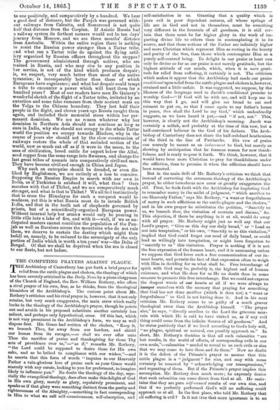THE FALL OF SIMARCAND.
ALL rumours from Central Asia converge on the statement that the Russians have either occupied, or are immedi- ately about to occupy, Samarcand. Whether the invaders have been invited by the Khan of Bokhara, or have been admitted by a party among his subjects, or have entered the old capital after a successful campaign, is still uncertain, but the fact can scarcely be a mere invention. And if it is not an invention, it is a very important fact. Nothing can be more ridiculous than the bugaboo stories of Russian designs with which the Indian press was at one time accustomed to excite the British public, which ultimately produced the war in Afghanistan, and which, we believe, all owed their origin to a single source. No Indian journalist or statesman of the second class will ever consider any policy which is not strictly Asiatic, and as Russia was then stronger in Asia than our- selves, her advance, which was real enough though exag- gerated, of necessity caused a panic. The idea of fighting her in the Baltic if she were troublesome on the Suleiman never entered Indian heads, and in fact the Afghan inva- sion, though avowedly undertaken out of fear of Russia, was fought out without a declaration of war on either side The old danger, the small European army, has disap- peared, the Empire is stronger than ever, the vulnerability of Russia has been proved, and men are at last convinced that it would be easier to resist an invasion of India from the North than to be constantly on the watch. When a coup de main is impossible, two years of campaigning are cheaper and, as we believe, safer than twenty of armed preparation. Nevertheless, though Russophobia has died away, and our strength is better understood, and the value of India to England is more exactly appreciated, the occupation of Samareand is a very great event. The place itself has associations which will never
cease to strike the political imagination. It was there that Timour set up the throne from which he governed all Northern Asia, much of Southern Asia, and hoped before he died to conquer the world. There is still shown the green stone from which he issued his decrees, and to which countless tribes of which Europe scarcely knows the names were accustomed to repair for justice. Thither converge all the old post roads which he con- structed so carefully over steppe and mountain, which he lined with mile-posts, on which he organized the most rapid postal service ever seen till the discovery of steam, and which Russia may if it pleases her still be able to repair. The city is still full of grand ruins, and so deeply did the lame con- queror stamp his image into the hearts of his people that now, after an interval of 350 years, the citizens speak of him, says M. Yambery, as if he had but just died at Otrar, and scrupulously obey his posthumous commands. All things have changed since then in Europe, civilization has armed herself, and science has come to the aid of courage, till Timour's army might be destroyed before it had captured a battery of Armstrong guns, till an order could be sent from Eng- land to Delhi in less time than Timour's quickest courier could saddle. But then of that change, and civilization, and marvellous access of power there is still in Northern Asia no trace, and the Russian Viceroy who sits in Timour's seat wields fifty times Timour's power, and may if be pleases do Timour's work, the conquest of India excepted, with less than the opposition which the Tartar chieftain overcame.
It is very difficult indeed to believe that Russia does not intend to do it, that she is persistently advancing from point to point at enormous expense without some definite end other and greater than a wish to increase the area of her steppes. What save a plan of dominion should take her into Turkes- tan? The three Khanats could not attack her, could not in- sult her, could not protect tribes flying from her rule, while Prince Gortschakoff so late as the 21st of November, 1864, informed all European Envoys that Russia liked them for neighbours, because "their populations were agricultural, com- mercial, and settled." Already her position in those regions is one which almost painfully affects the imagination. With the conquest of Turkestan, which follows sooner or later of necessity on the occupation of Samarcand, the Czar becomes absolute master of that world lying, as it were, in the shade, of which Europe knows nothing, but which stretches from Caspian to Kamschatka, from Europe to America, from the three mountain ranges which guard Southern Asia away to the North Pole. Throughout that enormous region, one hundred times as large as France, full of immense and fertile plains of unworked minerals, of tribes as wild as Red Indians and tribes who have built great cities, of colonies settled by the best blood of Poland and colonies of the worst convicts of Russia, with every variety of climate, from plains where the mastodon is preserved in ice to plains where the grape grows wild, yielding every produce from tobacco and tea to rye and fir- wood, the Czar's messengers are never stopped, his telegraph wires are never cut, his authority is on all but religious ques- tions the ultimate appeal. We are accustomed to say the power is nominal, but it changes all the habits of the tribes, it has suspended war, it has formed armies of rude cavalry which if useless against drilled soldiers, are as good as Zouaves against any enemy they are likely to encounter. The Russian officials may not govern in the sense in which the Indian Civil Service governs India, but they do govern as Indian residents do in Dative Courts, and for the greater purposes of life that government is complete. Nor is it altogether a govern- ment of force. No one out of Tobolsk probably knows the whole truth upon that point, but the evidence of all travellers, of all Chinese accounts, of all narratives by escaped exiles, of the visible fact of incessant progress, all point to the same result —acquiescence on the part of the people, and Europeans need in Asia only acquiescence. The Times points sensibly enough to the fewness of native Russians in Northern Asia as a cause of weakness, but they outnumber the English in India by five to one positively, and comparatively by a hundred. We hear a good deal of distance, but the Punjab was governed with- out railways from Calcutta, and Samarcand is not quite half that distance from the Caspian. If Asiatic Russia had a railway system its farthest corners would not be ten days' journey from Moscow, and we are three months' distance from Australia. Within the entire region there is nothing to resist the Russian power stronger than a Tartar tribe, 1-nd what can a Tartar tribe do against the flying artil- lery organized by Russian officers throughout the steppes ? The government administered through natives, who are trained in Russia, and who may rise to any position in her service, is not of the kind which produces despair; is, we suspect, very much better than most of the native tyrannies; is incomparably better than - those of which Europeans have cognizance; and what but despair could tempt a tribe to encounter a power which will hunt them for a hundred years ? Most of our readers have seen Be Quincey's wonderful sketch of the flight of a Tartar tribe, irritated by an extortion and some false rumours from their ancient seats on the Volga to the Chinese boundary. They lost half their people in the flight, and eleven years ago Russia caught them again, and included their memorial stone within her per- manent dominion. We see no reason whatever why her dominion in Northern Asia should not continue as long as ours in India, why she should not occupy to the whole Tartar world the position we occupy towards Hindoos, why in the course of years she should not by the slow construction of railways restore the whole of that secluded section of the world, now as much cut off as if it were in the moon, to the uses of civilization, breed cattle for export below the Altai, Bend copper from the same range into Swansea, and change the last great tribes of nomads into comparatively civilized men. They have become civilized enough in China and Japan. Why such an enterprise should be dreaded, or even dis- liked by Englishmen, we are entirely at a loss to conceive. Supposing the Russian Empire to march with our own in India, as if Turkistan is subdued it will, what then ? Ours marches with that of Thibet, and we are comparatively much stronger, and what is that to Thibet ? We all feel instinctively that to cross the Himalayas for such a conquest would be madness, yet this is what Russia must do to invade British India, and that in the teeth not of shepherds governed by priests, but of a scientifically-organized European power. Without internal help her armies would only be pouring in little rills into a lake of fire, and with it—well, if we as un- disputed masters cannot conciliate the population of the Pun- jab as well as Russians across the mountains who do not rule them, we deserve to sustain the destiny which might then befall us, namely, to be reduced to the sovereignty of the only portion of India which is worth a ten years' war—the Delta of Bengal. Of that we shall be deprived when the sea is closed to our fleets, but not before.































 Previous page
Previous page